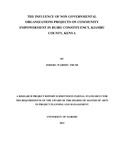| dc.description.abstract | The effective engagement of an NGO in community empowerment entails organisational
orientation in terms of its vision, principles, goals, strategies and its activity components. Most
research studies done on NGOs in Kenya tend to focus more on the outcomes of programmes,
rather than on organizational processes, this report looked at the influence of NGOs in enhancing
community empowerment in Ruiru Constituency, Kiambu County. The objectives of this
research were the NGO’s capacity building programmes, Social Mobilization approaches,
Project Sustainability mechanisms and Service delivery methods. The study was based on the
Empowerment theory and the six I’s of community Development theory. The research design
used was descriptive with a target population of 144 community representatives and 45 project
management team. The sample size for this study derived from Krejcie and Morgan Table was
124 respondents for community representatives and 43 respondents for project management team
and the sampling technique was purposive sampling. The study used questionnaires as
instruments to collect data and were distributed to both office based and field based staff and the
community representatives. Content validity and Internal Consistency Reliability Test were used
to determine the accuracy of the questionnaires. The return rate was 79.03% from community
representatives and 95.35% from the project management team. It was noted that the majority of
the respondents were female. By use of the Internal Consistency Reliability Test, the score was
above 0.7 for all the four objectives measured, thus deemed acceptable and to establish validity,
content validity was used and the questionnaire were found to be valid. Content analysis was
used to analyze the qualitative data and the findings were presented in a prose form. Quantitative
data was analyzed using descriptive statistics including frequency, percentages, standard
deviations and pearson product moment correlation. The findings were that the four objectives
Capacity building, Social Mobilization, Project Sustainability and Service Delivery showed some
positive correlation. This means there was significant influence with Community Empowerment,
however Project Sustainability was seen to be the most influential and Capacity Building the
least. The Recommendations were that the management of the NGOs should consider recruiting
more staff with skills and competence, should improve on community involvement through
project acceptance and ownership in a community, ensure employee satisfaction through
appropriate financial rewards and improve on use of information technology that will assist on
documentation and communication amongst various teams | en_US |

